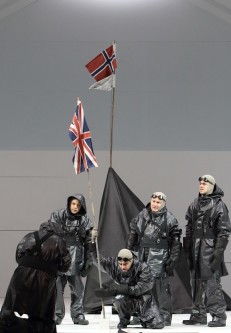 Germany Srnka, South Pole: Bayerisches Staatsorchester, Kirill Petrenko (conductor), Nationaltheater, Munich, 9.2.2016 (JMI)
Germany Srnka, South Pole: Bayerisches Staatsorchester, Kirill Petrenko (conductor), Nationaltheater, Munich, 9.2.2016 (JMI)

© Wilfried Hösl
New Production
Direction: Hans Neuenfels
Sets: Katrin Connan, Hans Neuenfels
Costumes: Andrea Schmidt-Futterer
Lighting: Stefan Bolliger
Cast:
Roald Amundsen: Thomas Hampson
Robert Scott: Rolando Villazón
Kathleen Scott: Tara Erraught
Landlady: Mojca Erdmann
Oates: Dean Power
Uncle Bill: Kevin Conners
Evans: Matthew Grills
Bowers: Joshua Owen Mills
Johansen: Tim Kuypers
Oscar: John Carpenter
Hanssen: Christian Rieger
Bjaaland: Sean Michael Plumb
This opera by Czech composer Miroslav Srnka had its world premiere on 31 January. Expectations ran high, considering that it was to take place in a top opera house under the baton of one the very best conductors today, with a cast headed by two great figures. Suffice it to say that the theatre is sold out for each of the performances.
It was commissioned by the Bayerische Staatsoper from Czech composer Miroslav Srnka and Tasmanian librettist Tom Holloway after the strong impression made by the 2011 Munich premiere of their opera Make No Noise. After considering several subjects, the theatre, composer and librettist decided on the conquest of the South Pole. The opera only acquired its final title last July.
The excellent libretto narrates the race between the Amundsen and Scott expeditions to conquer the South Pole in 1912. The Norwegians arrived first; Scott and his team died during the trip back. The libretto is well-constructed and always holds the audience’s interest. It is a sort of double opera where we follow both expeditions up to the final conquest of the South Pole. With Miroslav Srnka’s modern music, clearly you do not leave the theatre humming melodies. However, it combines well with the dramatic flow in an orchestration that is very bright at times, with moments of great lyricism, particularly the quartet of Amundsen, Scott and their beloveds that closes the first part of the opera. The presence of the characters of Kathleen (Scott’s wife) and the Landlady (Amundsen’s lover) in the expeditions is resolved by making their appearances imaginary. In short, it is an interesting work, but it might have gone unnoticed without the star presence to which I referred above.
One of the advantages of attending the world premiere of an opera is that the stage direction has to be faithful to the plot. The sets provide an empty space, enclosed by white walls, very well suited to the freezing atmosphere of the opera. The stage is divided into two parts, the left for British, dressed in black, and the right for Norwegians, dressed in white. Hans Neuenfels does an interesting job and narrates the action well, in particular the scene of the animal sacrifices (ponies for the British and dogs for the Norwegians), and the double arrival of the expeditions at the South Pole. The lighting is remarkable.
Srnka’s music presents a lot of difficulties, and it requires an exceptional conductor to carry it forward. Suffice it to say that the score is not written on normal paper, but on 50 centimeter-long sheets. Srnka even writes out the music for each individual string instrument, apart from the abundant percussion. Kirill Petrenko had much to do with this premiere, and I found his conducting masterful. One will be even more aware of his prodigious reading if the occasion arises to see this opera under a different baton. We had, as usual, an impeccable orchestra in the pit.
The main characters of the opera are Roald Amundsen and Robert Scott, played respectively by Thomas Hampson and Rolando Villazon. All opera lovers know that both are in vocal decline, though for very different reasons. Miroslav Srnka proves that he knows how to write for voices: here, they have to use their middle registers, and they must base their performances as singers more on expressiveness than on any vocal showing-off. Both singers were blameless interpreters, especially Thomas Hampson. At times, Rolando Villazon had trouble projecting his voice, and there was a wide vibrato as the tessitura went up. In any case, the two served their characters nicely.
Tara Erraught in the part of Kathleen Scott did well. Mojca Erdmann played the Landlady, and she was bright in the part, the most demanding role of the four main characters in terms of high notes.
The British expedition consisted of four tenors, while Norway’s was formed by four baritones. They all gave good performances.
The theatre was sold out, and the audience seemed satisfied, although not enthusiastic. Kirill Petrenko received the best reception.
Jose M. Irurzun
